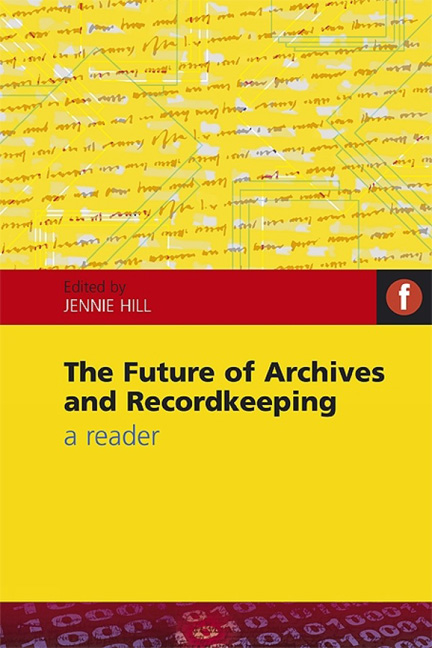Book contents
- Frontmatter
- Dedication
- Contents
- Acknowledgements
- Contributors
- Introduction: seeing the future of archives and recordkeeping
- Part 1 Defining archives
- Part 2 Shaping a discipline
- 4 Structural and formal analysis: the contribution of diplomatics to archival appraisal in the digital environment
- 5 Archivistics: science or art?
- Part 3 Archive 20: archives in society
- Part 4 Archives in the information age: is there still a role for the archivist?
- Index
- Miscellaneous Endmatter
- Miscellaneous Endmatter
- Miscellaneous Endmatter
5 - Archivistics: science or art?
from Part 2 - Shaping a discipline
Published online by Cambridge University Press: 08 June 2018
- Frontmatter
- Dedication
- Contents
- Acknowledgements
- Contributors
- Introduction: seeing the future of archives and recordkeeping
- Part 1 Defining archives
- Part 2 Shaping a discipline
- 4 Structural and formal analysis: the contribution of diplomatics to archival appraisal in the digital environment
- 5 Archivistics: science or art?
- Part 3 Archive 20: archives in society
- Part 4 Archives in the information age: is there still a role for the archivist?
- Index
- Miscellaneous Endmatter
- Miscellaneous Endmatter
- Miscellaneous Endmatter
Summary
Introduction
‘L'archivistique est-elle une science ou un art?’ was the question put by Bruno Delmas at the conference Archival Science on the Threshold of the Year 2000 held in 1990 at the University of Macerata (Italy), and he repeated the question in the first issue of the journal Archival Science, published in 2001. However, while his original question can be translated as the title of this chapter, Delmas used in the Archival Science article a different term, asking ‘Is archiving a science or an art?’ The difference is not just a slip of the pen while translating: the contrast reflects the distinction between archivage (archiving) and archivistique (archivistics or archival science) which through time and in different places has been interpreted differently.
Many people would regard archiving an art, if an art is ‘something which can be achieved or understood by the employment of skill and knowledge’ (OED, 2010a). Surely most, if not all, aspects of archiving necessitate the employment of skill and knowledge. Sorting, for example, was considered by the great Hilary Jenkinson (1922, 75) as an art: ‘one of the most difficult which the most skilled archivist could undertake’. His Canadian colleague W. Kaye Lamb (1962) called appraisal and selection of archives ‘the fine art of destruction’. Archival description invokes skills of interpretation and creative talents. One can therefore appreciate that early 19th-century Spanish manuals described the ‘arte de archiveros’ (the archivists’ art).
Considering the archivist's work as an art, does not preclude considering archivistics as a science. Borje Justrell (1999, 46) wrote: ‘Some of the matters that archivists deal with in their professional work are not of any concern to archival science, and some problems of archival science are not of any concern to the archival profession.’ I do not share the second part of this statement. Theory informs the archivist's methodology and practice, but that practice is not driven by theory. However, archivistica applicata and archivistica pura are not opposites, they follow naturally from one another (see Ketelaar, 2007). Both are connected by what Anne Gilliland-Swetland (2000) has called the archival paradigm: ‘a set of assumptions, principles, and practices that are common to the archival community and are a model for its activities and outlook’.
- Type
- Chapter
- Information
- The Future of Archives and RecordkeepingA reader, pp. 93 - 104Publisher: FacetPrint publication year: 2010



